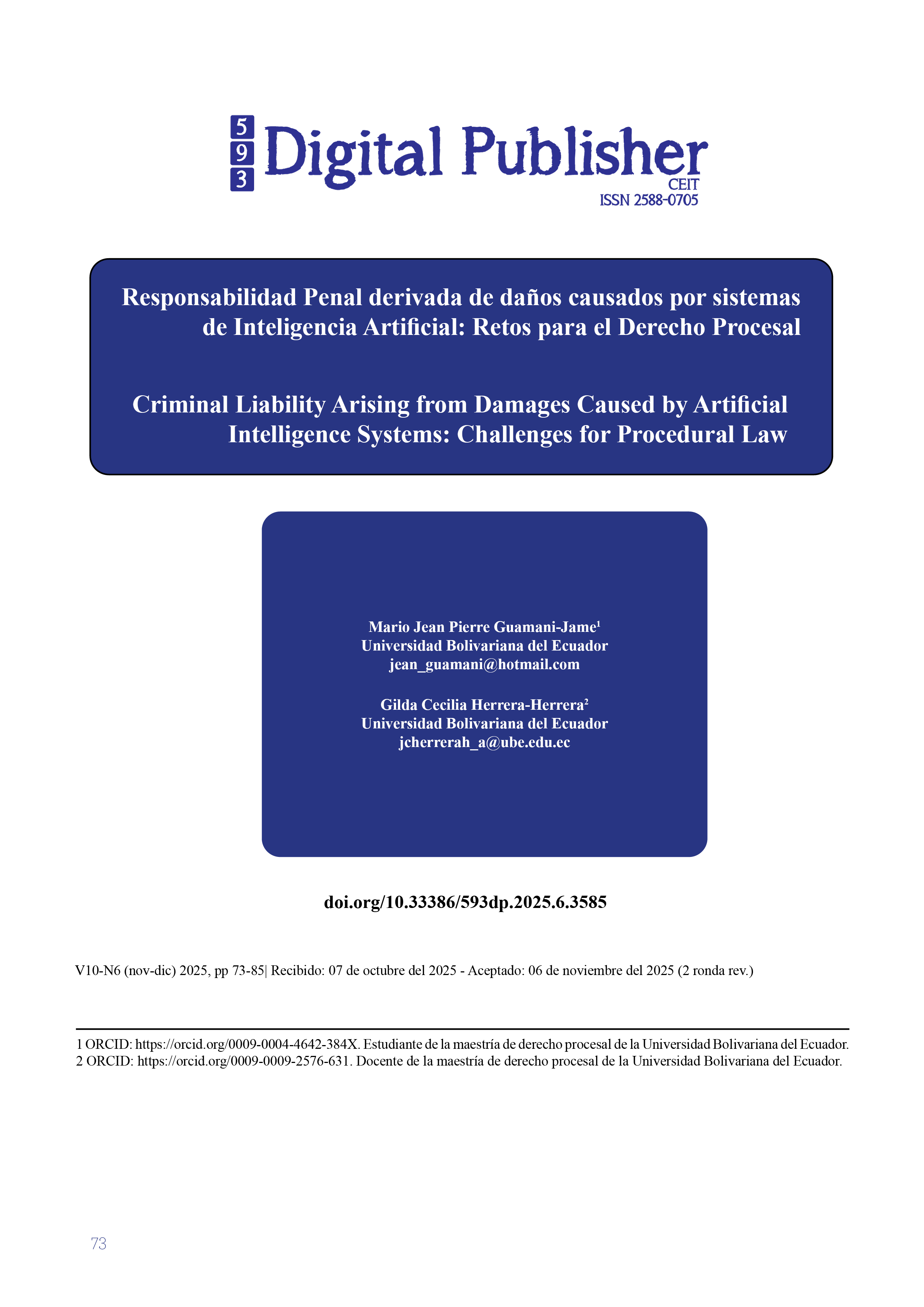Criminal Liability Arising from Damages Caused by Artificial Intelligence Systems: Challenges for Procedural Law
Main Article Content
Abstract
Artificial intelligence is creating new challenges for criminal law if it's used to cause harm to protected legal assets. Institutions like Unesco have expressed their concern, noting that it can violate human rights. The research conducted has found countries that have begun to work on their legislation, such as Colombia through Law No. 2502, which modified the Criminal Code to establish an aggravating factor for the crime of personal falsehood when committed using Artificial Intelligence. Similarly, Peru with Law 32314, which amends the Criminal Code and the Computer Crimes Law to include the use of Artificial Intelligence as an aggravating factor in the commission of various crimes and reforms to the criminal offenses, showing these countries an effort to understand, regularize, and combat its use in crime. In Ecuador, the criminal liability for this is not yet codified; however, the Comprehensive Organic Criminal Code does in some way pursue crimes that can use this technology, such as harassment, violation of privacy, identity theft, and sexual freedom offenses. Therefore, the challenge for Ecuador is to work on criminal legislation to include the criminal liability of artificial intelligence, either as an aggravating factor or in new criminal offenses, and thus ensure that criminal justice can adapt to technological advances and protect the fundamental rights of citizens.
Downloads
Article Details

This work is licensed under a Creative Commons Attribution-NonCommercial-ShareAlike 4.0 International License.
1. Derechos de autor
Las obras que se publican en 593 Digital Publisher CEIT están sujetas a los siguientes términos:
1.1. 593 Digital Publisher CEIT, conserva los derechos patrimoniales (copyright) de las obras publicadas, favorece y permite la reutilización de las mismas bajo la licencia Licencia Creative Commons 4.0 de Reconocimiento-NoComercial-CompartirIgual 4.0, por lo cual se pueden copiar, usar, difundir, transmitir y exponer públicamente, siempre que:
1.1.a. Se cite la autoría y fuente original de su publicación (revista, editorial, URL).
1.1.b. No se usen para fines comerciales u onerosos.
1.1.c. Se mencione la existencia y especificaciones de esta licencia de uso.
References
Banco del Pacífico. (2025). Seguridad. https://www.bancodelpacifico.com/seguridad
Centro Latinoamericano para el Desarrollo. (2023). Carta Iberoamericana de Inteligencia Artificial en la Administración Pública. https://acrobat.adobe.com/id/urn:aaid:sc:VA6C2:b8c8cecc-5fb1-453a-8b83-af95ebf0e3d5?s=08
Colombia. (2025). Ley No. 2502 de 28 de julio de 2025. https://ccdpc.org.co/ley-2502-de-2025/#:~:text=Por%20medio%20de%20la%20cual,uso%20de%20la%20Inteligencia%20Artificial
De la Cuesta, P. (2019). Inteligencia artificial y responsabilidad penal. Revista Penal México, 9(16-17), 51–62. https://tipg.link/gx8_
Ecuador. (2008). Constitución de la República del Ecuador. Registro Oficial No. 449.
Ecuador. (2021a). Código Orgánico Integral Penal. Registro Oficial, Suplemento No. 180.
Ecuador. (2021b). Ley Orgánica de Protección de Datos Personales. Registro Oficial, Suplemento 459.
Elderecho.com. (s.f.). La inteligencia artificial y la nueva delincuencia. https://elderecho.com/la-inteligencia-artificial-y-la-nueva-delincuencia
Faramiñán Gilbert, J. M. de. (s.f.). La inteligencia artificial y el principio de incertidumbre. https://drive.google.com/file/d/1kohS-RdHjV0ZcAjp6Vs7ciqZvQJCPN9H/view
García Falconí, R. J., & Barona Pazmiño, K. F. (2024). Inteligencia artificial y proceso penal. http://scielo.senescyt.gob.ec/scielo.php?script=sci_arttext&pid=S2528-79072024000200087
López Soria, Y. (2022). La culpabilidad prescindible como elemento en la estructura del delito. http://scielo.sld.cu/scielo.php?script=sci_arttext&pid=S2218-36202022000600278
Maluenda, R. (2023). Qué es un algoritmo informático: características, tipos y ejemplos. Profile Software Services. https://profile.es/blog/que-es-un-algoritmo-informatico/
Ministerio de Telecomunicaciones y de la Sociedad de la Información. (2025, 6 de agosto). Ecuador avanza en la construcción participativa de lineamientos para el uso y desarrollo ético y responsable de la inteligencia artificial. https://www.telecomunicaciones.gob.ec/ecuador-avanza-en-la-construccion-participativa-de-lineamientos-para-el-uso-y-desarrollo-etico-y-responsable-de-la-inteligencia-artificial/
Perú. (2025). Ley No. 32314 de 29 de abril de 2025. https://busquedas.elperuano.pe/dispositivo/NL/2394851-2
Proceso. (2025). Inteligencia artificial con ética: La urgencia de una regulación responsable. https://www.proceso.com.mx/opinion/2025/7/24/inteligencia-artificial-con-etica-la-urgencia-de-una-regulacion-responsable-355429.html?s=08
Susana Checa Prieto. (2022). ¿Estamos caminando hacia el reconocimiento de la personalidad jurídica a los robots en la Unión Europea? https://www.revistarue.eu/RUE/072022.pdf
Unión Europea. (2024). Reglamento del Parlamento Europeo y del Consejo por el que se establecen normas armonizadas en materia de inteligencia artificial (Ley de Inteligencia Artificial).
UNESCO. (2023a). La inteligencia artificial: ¿Necesitamos una nueva educación? https://unesdoc.unesco.org/in/documentViewer.xhtml?v=2.1.196&id=p::usmarcdef_0000386262&file=/in/rest/annotationSVC/DownloadWatermarkedAttachment/attach_import_ee2d12df-273c-4dcb-8ec3-290946f60445%3F_%3D386262spa.pdf&locale=es&multi=true&ark=/ark:/48223/pf0000386262/PDF/386262spa.pdf
UNESCO. (2023b). Kit de herramientas global sobre IA y el estado de derecho para el poder judicial. https://acrobat.adobe.com/id/urn:aaid:sc:VA6C2:ac7a9d1b-22fa-4612-989d-f8d176d7986f?s=08&viewer%21megaVerb=group-discover
UNESCO. (2023c). La IA y el Estado de derecho: Fortalecimiento de capacidades para los sistemas judiciales. https://www.unesco.org/es/artificial-intelligence/rule-law/mooc-judges



